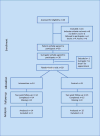A randomized controlled pilot trial to improve advance care planning for LVAD patients and their surrogates
- PMID: 26948697
- PMCID: PMC5748890
- DOI: 10.1016/j.hrtlng.2016.01.005
A randomized controlled pilot trial to improve advance care planning for LVAD patients and their surrogates
Abstract
Objectives: To examine feasibility, acceptability and preliminary effects of an advance care planning (ACP) intervention, SPIRIT-HF, in LVAD patients and their surrogates.
Background: LVADs may improve HF symptoms but they are not curative. Thus, ACP is needed to prepare patients and surrogates for end-of-life (EOL) decision-making.
Methods: Bridge to transplant and destination therapy LVAD patient-surrogate dyads were randomized to either SPIRIT-HF or usual care. Percentages of eligible dyads who were enrolled and completed the study determined feasibility. Analysis of interviews with SPIRIT dyads determined acceptability. Group comparisons of dyad congruence, patient's decisional conflict, and surrogate's decision-making confidence determined preliminary effects.
Results: Of 38 eligible dyads, 29 (76%) were enrolled, randomized, and completed the study. The 14 intervention dyads characterized SPIRIT-HF as beneficial. All dyads demonstrated improvement in outcomes. However, SPIRIT-HF dyads tended toward greater congruence on patient EOL treatment goals.
Conclusions: SPIRIT-HF is feasible and acceptable. Results will inform future trials.
Keywords: Advance care planning intervention; End-of-life care; Family members; LVADs; Surrogates.
Copyright © 2016 Elsevier Inc. All rights reserved.
References
-
- Lietz K. Destination therapy: Patient selection and current outcomes. J Card Surg. 2010;25(4):462–471. - PubMed
Publication types
MeSH terms
Grants and funding
LinkOut - more resources
Full Text Sources
Other Literature Sources
Medical
Research Materials
Miscellaneous


